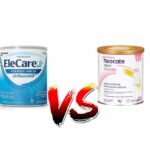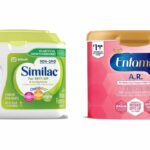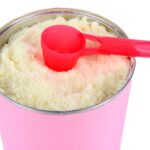As a parent, you only want the best for your little one. From choosing their food or their car seat that makes the most sense for your little pride and joy, the decisions are endless.
It can be stressful when you’re doing all the research you can, trying to figure out the right choices, only to find conflicting information.
When it comes to feeding your child, you care about what’s on the ingredients list, and you also care that your baby is happy, full, and enjoying the food they eat and drink. You know what to look for, and you’re committed to finding the best nutritional options for your baby.
One of the biggest decisions you’ll make when deciding how to feed your baby is whether you’ll give them oatmeal or rice cereal. As well as the decision of which cereal type makes the most sense for their growing body.
If you’re in the midst of the oatmeal vs rice cereal debate, don’t worry. We’ve got you covered. Read on to learn about the benefits of each option, and know what type of cereal we believe is best.
View in gallery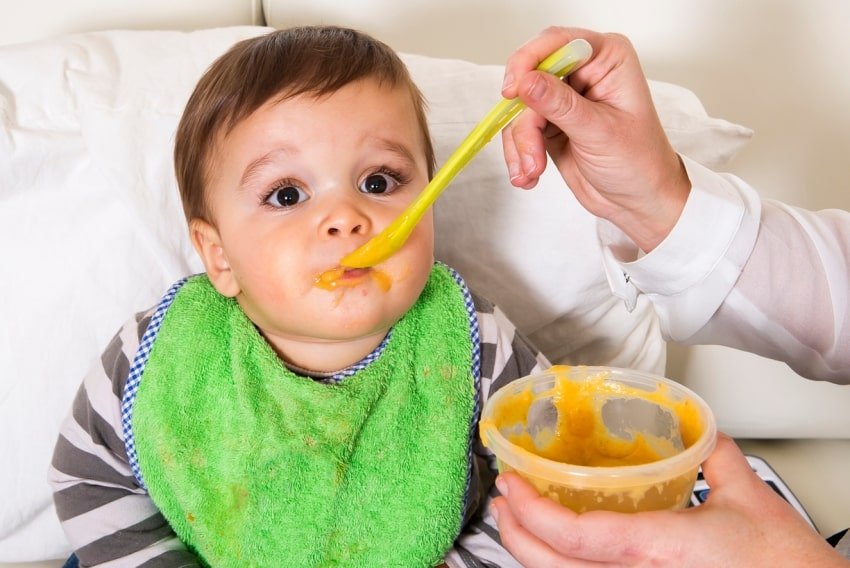
In this article
Oatmeal Vs Rice Cereal: What’s The Difference?
When deciding between oatmeal vs rice cereal, you’ll want to consider several factors to help you decide which option makes the most sense for your baby. Let’s take a look at some of the main differences between oatmeal and rice cereal for babies.
Origin
Clearly, oat cereal originates from oats, while rice cereal originates from rice. Both are grains and can be organic or conventionally farmed. You also have flavored or unflavored choices.
Taste
While your baby won’t be able to talk to you about the flavor profile of their first solid foods, you may notice that they have a clear preference for one type of cereal over the over.
Rice cereal is nearly tasteless, while oat cereal can have a nutty taste. Think about the taste of plain, white rice compared to the taste of oatmeal, and you’ll get an idea of what the difference is like for your baby.
Nutrition
While rice cereal can be quite filling for your little one, it doesn’t have much in terms of nutritional value. Oat cereal, on the other hand, is high in fiber and has a stronger nutritional profile.
Tummy Issues
If your baby often struggles to go number two, you’ll want to pay attention to this point. Rice cereal is more likely to cause constipation than oat cereal. If everything is flowing smoothly with your baby, this won’t be an issue.
Allergies
You’ll want to follow your pediatrician’s recommendations on introducing potential allergens to your baby. No matter what route you take, it’s important to keep in mind that rice cereal is far less likely to cause an allergic reaction than oat cereal.
View in gallery
When Can You Start Feeding A Baby Cereal?
The American Association of Pediatrics recommends that parents hold off on giving their babies solid food until six months of age.
While past generations swore by putting a little cereal in a newborn baby’s bottle to help them sleep, pediatricians caution against doing this today. Infants and very young babies get all the nutrition they need from formula or breast milk.
In addition to waiting until at least six months of age, you’ll want to look for these signs:
- Your baby has good control of his or her head. They should be able to easily pick up and turn their head. This reduces the risk of choking on solid food.
- They should be able to sit up with little or minimal support. If you need to place a hand on their back or their belly to keep them steady, no problem. If they need to be fully propped up in order to sit, it’s a good idea to hold off.
- Wait until your baby shows interest in food. They should lean forward and open their mouth when food is offered. If your baby isn’t showing interest in food yet, you may want to hold off.
Now, let’s take a look at the difference between rice cereal and oatmeal for baby, and which one makes the most sense when you decide that it’s time to introduce solid foods.
Oatmeal Cereals
Oatmeal cereals can be a great way for your baby to get the nutrition that they need. In addition to helping your little one feel full, oatmeal cereals also provide fiber, vitamins, and minerals that will help your little one’s development.
You can mix oatmeal cereal with formula or breast milk, which can help to offset the nutty flavor of oatmeal as your baby begins to explore solid food. Providing a familiar taste can be a helpful way to ease your baby into trying something new.
One con of oatmeal cereal (or a pro, depending on your opinion): babies tend to absolutely love it. This can lead to them wanting oatmeal cereal in place of trying other solid foods. As a parent, it’s key to ensure that you’re exposing your baby to plenty of new tastes.
View in gallery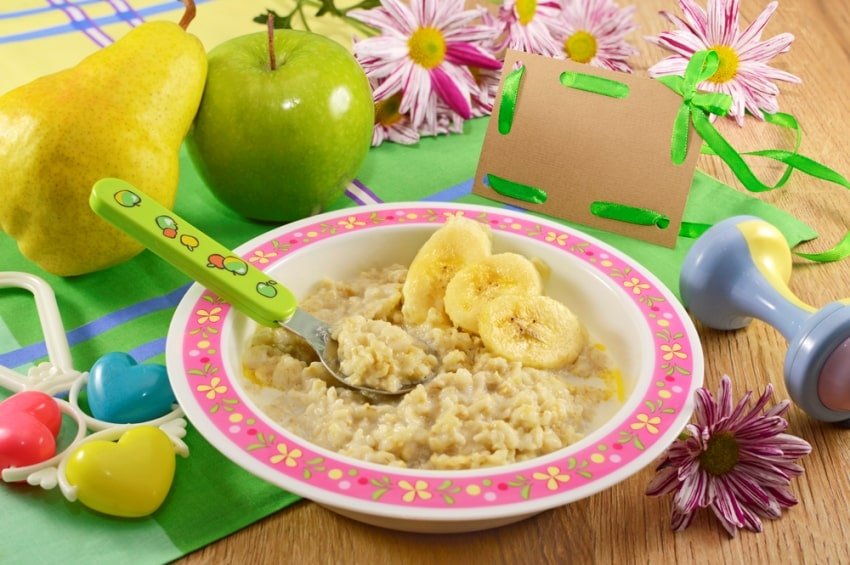
According to registered dietitian Jessica Penner, “Since babies tend to accept the cereal pretty readily, it can be easy for parents to keep feeding their children the cereal and not persist at exposing them to other foods.”
You may want to rely on oatmeal cereals when you’re in a rush, like in the car, or otherwise not able to have them try food with the rest of the family. As your child grows, you’ll want them to have varied tastes for different foods.
Exposing them to lots of different options early on is a great way to get them curious and engaged at the table.
Another thing to watch out for if you decide to go with oatmeal cereal is gluten. While some babies can process gluten just fine, others cannot. Oats themselves are gluten-free, but the vast majority of oat processing plants also process products that contain gluten.
Keep a close eye on your baby if you start them off with oatmeal cereal. Since this is likely their first solid food, this may be the first time they’re exposed to gluten. If your baby is sensitive to gluten, be sure to purchase certified gluten-free oatmeal cereal.
The 5 Best Baby Oatmeal Cereal Brands
We know you want the best for your kiddo – and all the research that goes along with providing the best can be exhausting. Surprise: we’ve taken that off your to-do list. Check out our recommendations for the five best baby oatmeal cereal brands.
1. Gerber
A tried and true brand of all things babyhood, Gerber comes out on top when it comes to oatmeal for baby. Gerber’s oatmeal cereals are free of artificial colors and flavors and contain iron to support healthy brain development.
As the #1 pediatrician-recommended baby food brand, it’s clear why Gerber comes out on top. It’s a brand that parents and doctors alike trust, and for good reason.
The company is committed to sourcing non-GMO ingredients and fortifies their oatmeal cereal with zinc, vitamin C, vitamin E, calcium, and six B vitamins. With organic options, flavored options (like Gerber’s Oatmeal Banana Strawberry Baby Cereal – yum!), and options with DHA added.
You’ll be able to find exactly what you need in an oatmeal cereal from the Gerber line.
- STRAWBERRY BANANA OATMEAL: This cereal contains Vitamins C, E, Zinc & 6 B vitamins for healthy development, plus calcium for healthy bones & teeth. Made with Non-GMO ingredients with no artificial colors or flavors.
- TRANSITION FOOD: Lil Bits cereals have added texture to help babies learn to chew, mash & transition to table food. Introduce your older baby to new tastes & textures while providing essential nutrition.
- PEDIATRICIAN RECOMMENDED: Gerber Cereal is the #1 pediatrician-recommended brand for infant cereals among pediatricians who recommend infant cereal.
Prices pulled from the Amazon Product Advertising API on:
Product prices and availability are accurate as of the date/time indicated and are subject to change. Any price and availability information displayed on [relevant Amazon Site(s), as applicable] at the time of purchase will apply to the purchase of this product.
2. Happy Baby Organics
Compared to Gerber, Happy Baby is a newcomer in the baby food industry. You may want to give them a try.
This oatmeal cereal boasts a silky smooth texture. It’s perfect if you’ve started your baby on rice cereal, and now want to provide them with a larger boost of nutrition.
With iron to support brain development, 17% of the protein your baby needs each day, and vitamin C, Happy Baby Oatmeal Cereal is a great way to fill your little one’s tummy. A bonus feature of this brand is that it comes in a resealable pack, cutting down on spills.
- CLEARLY CRAFTED CEREAL: Made with organic oats, quinoa, Vitamin C & iron that helps support brain development, this organic, whole grain cereal is ideal for babies learning to explore taste & texture with solid foods. Bonus: it comes in a resealable pack!
- ORGANIC WHOLE GRAIN CEREAL: Happy Babys Whole Grain Oats & Quinoa and Whole Grain Oatmeal Clearly Crafted Cereals are designed with simple, organic ingredients like whole grain oats and quinoa with 45% DV of iron to help support babys brain development.
- HAPPY BABY: At Happy Baby Organics, we provide organic and delicious options for your babys nutritional journey. We develop premium organic recipes perfectly matched with your childs age and stage. This is enlightened nutrition for every family.
Prices pulled from the Amazon Product Advertising API on:
Product prices and availability are accurate as of the date/time indicated and are subject to change. Any price and availability information displayed on [relevant Amazon Site(s), as applicable] at the time of purchase will apply to the purchase of this product.
3. Earth’s Best Organic
Available with and without fruit, Earth’s Best Organic Oatmeal Cereal is a healthy way to ensure that your baby gets a great start when it’s time to eat solid food. Free of salt, refined sugar, and preservatives, Earth’s Best works to provide your baby with everything they need – and nothing that they don’t.
With iron, thiamin, niacin, folic acid, zinc, calcium, vitamin E, riboflavin, vitamin B6, and vitamin B12, starting your baby’s day with Earth’s Best is a great way to give them long-lasting energy to help them get through a busy time of learning, playing, and snuggling with mommy or daddy.
- Twelve 8 oz. boxes of Earths Best Organic Whole Grain Oatmeal Infant Cereal
- Made with whole grains
- Iron fortified for infant growth and development
- No artificial flavors, colors or preservatives
- USDA-Certified Organic and made with non-GMO ingredients
Prices pulled from the Amazon Product Advertising API on:
Product prices and availability are accurate as of the date/time indicated and are subject to change. Any price and availability information displayed on [relevant Amazon Site(s), as applicable] at the time of purchase will apply to the purchase of this product.
4. Beech-Nut
Made with non-GMO oat flour, Beech-Nut oatmeal cereal is a great way to get your baby’s solid food journey off to a perfect start. With each serving, your little one gets 60% of their daily iron need and a hefty dose of vitamin D, calcium, folic acid, phosphorus, zinc, pantothenic acid, vitamin B, riboflavin, and niacin.
It’s important to note that this brand of oatmeal cereal does contain wheat, so you’ll want to steer clear if your baby is sensitive to gluten.
- This Stage 1 organic infant cereal is a great option for adding a solid food into baby’s diet, as it’s a hearty blend that will help fill baby’s tummy.
- Beech-Nut® Organics Oatmeal Baby Cereal is made with non-GMO oats.
- It has a creamy, easy-to-digest texture and provides baby with 60% daily value of iron, an essential nutrient that helps support early brain development.
Prices pulled from the Amazon Product Advertising API on:
Product prices and availability are accurate as of the date/time indicated and are subject to change. Any price and availability information displayed on [relevant Amazon Site(s), as applicable] at the time of purchase will apply to the purchase of this product.
5. Fleur Alpine
This organic option hails from Germany, and it’s popular with babies around the world. Fleur Alpine prides itself on helping babies get the healthiest start possible.
The company caters to babies who are sensitive to dairy, who need a no added sugar diet, who have allergies to synthetic products (including vitamins), and more. Just like Beech-Nut products, be careful if your little one has a gluten sensitivity, as Fleur Alpine oatmeal baby cereal does contain wheat.
- 100% whole grain
- No added sugar and salt
- Easily absorbed and digested due to tender consistency
- Organic product
- Shelf life: 18 months
Prices pulled from the Amazon Product Advertising API on:
Product prices and availability are accurate as of the date/time indicated and are subject to change. Any price and availability information displayed on [relevant Amazon Site(s), as applicable] at the time of purchase will apply to the purchase of this product.
Rice Cereals
Rice cereals can be a great way for parents to help ease babies into enjoying solid foods. It provides a blank palette, perfect for blending with new tastes. Many parents find that rice cereal provides an easily digestible way for babies to try the flavors of pureed fruits and vegetables.
Some babies struggle with textural issues when they begin to try solid foods. Using rice cereal as a backdrop to get a taste of the flavor of a new fruit or veggie can be the perfect way to let your little one explore their taste buds.
Rice cereal is easy for little ones to digest, and if you want to amp up the nutrition factor a bit, you can choose a rice cereal made with brown rice. The texture of rice cereal is very smooth, making it just a stone’s throw away from the milk or formula they know and love.
Using rice cereal as a first solid food can help your baby to gently ease into the process of enjoying something other than milk or formula.
Something to watch out for with rice cereal is many of these products contain small amounts of arsenic. While these amounts are negligible in an adult body, the same is not true for a tiny baby body. Pediatricians recommend feeding rice cereal no more than six times per week in an effort to keep arsenic levels low in your baby.
Constipation can also be an issue with rice cereal. If you notice that your baby is becoming constipated, you may want to try to blend some fruit or vegetable purees in with their rice cereal.
If this doesn’t get the job done, it may be time to consider switching to a bowl of cereal with less of a binding effect.
The 5 Best Baby Rice Cereal Brands
Thinking about going the rice cereal route? We’ve got you covered. Check out these top five rice cereal brands for your little lovey.
1. Gerber
The baby product giant strikes again, coming in at number one for rice baby cereals. The options under the umbrella of Gerber rice cereals are vast.
| Title | Price | Prime | Buy | |
|---|---|---|---|---|
 Top
Top | Gerber Baby Cereal Probiotic Rice Banana Apple Baby Cereal | PrimeEligible | Buy Now | |
 Top
Top | Gerber DHA & Probiotic Single-Grain Rice Baby Cereal, 8 Ounces | PrimeEligible | Buy Now | |
 | Gerber Baby Cereal Organic Rice Cereal, 8 Ounces (Pack of 6) | PrimeEligible | Buy Now |
Choose from added probiotics, banana and apple flavoring, organic options, and more. If you’re not sure whether rice or oatmeal cereal is going to be the best fit for your baby, you may want to check out Gerber’s variety packs. You can get both options for a lower price than buying them separately.
2. Kitchdee Organic
This combination of rice and lentil cereal is perfect for babies who struggle with digestive issues. Lightly flavored with cumin, this organic cereal is cooked in small batches.
The lentils in Kitchdee Organic are sprouted to allow for your child to absorb as many nutrients as possible. Free of preservatives and artificial flavors, Kitchdee Organic is a great choice for any parent who wants to maximize their baby’s nutrition.
- OUR RECIPE :Rice & Lentil Baby Cereal is made with fresh grains, sprouted lentils and nuts that are sprouted for easy nutrient absorption. Our cereal is lightly flavored with cumin for natural taste and easy digestion.
- ORGANIC BABY CEREAL: 100% Sugar free and contains NO preservatives and NO artificial Flavors. Shelf life of upto 6 months.
- HEALTHY & HAPPY BABY CEREAL: Made in small batches and all grains are roasted and precooked. So, its gentle on little tummies.
- BABY FIRST FOOD: Our organic baby cereal stage 1 is nutritious and a great transition food for babies. Absolutely NO FILLERS!
Prices pulled from the Amazon Product Advertising API on:
Product prices and availability are accurate as of the date/time indicated and are subject to change. Any price and availability information displayed on [relevant Amazon Site(s), as applicable] at the time of purchase will apply to the purchase of this product.
3. Bio-Kinetics
Made from sprouted whole grain rice, rice baby cereal from Bio-Kinetics is a great way to give your baby a nutritional boost that they won’t likely get from other rice cereals.
When you choose a rice cereal made from brown rice, your baby gets increased nutrition and fiber compared to what they’d get from a bowl of white rice cereal.
- Pack of 2, Gluten-Free, Organic, Sprouted Whole Grain Brown Rice Cereal
- Delicious, Nutritious, Additive-Free and Perfect for Your Little Ones
- Loved by Babies and Toddlers - and Grown-ups Love It Too!
- Packed with Expressed Nutrients, Enzymes, FOS and MOS plus the natural benevolent probiotic flora of our sprouted grains
- Nutty, earthy fragrance characteristic of fresh, sprouted grains - not like other processed dry cereals with no smell
Prices pulled from the Amazon Product Advertising API on:
Product prices and availability are accurate as of the date/time indicated and are subject to change. Any price and availability information displayed on [relevant Amazon Site(s), as applicable] at the time of purchase will apply to the purchase of this product.
4. Beech-Nut
This rice cereal is packed with vitamins and minerals: each serving includes vitamin D, vitamin A, zinc, biotin, and calcium.
Reviewers of Beech-Nut baby rice cereals say that their babies prefer the taste of Beech-Nut over other brands (even the more expensive ones). Loaded with iron, this cereal boasts a creamy texture that allows your baby to easily begin the transition to solid food.
- Great first food for starting solids.
- Easy-pour spout and curved grip prevents spilling.
- Built-in measuring cap makes portioning a snap.
- Includes vitamins and minerals: 10% DV vitamin A, 20% DV vitamin D, 25% DV zinc, 20% DV calcium, 10% DV biotin
Prices pulled from the Amazon Product Advertising API on:
Product prices and availability are accurate as of the date/time indicated and are subject to change. Any price and availability information displayed on [relevant Amazon Site(s), as applicable] at the time of purchase will apply to the purchase of this product.
5. Earth’s Best Organic
Committed to creating organic products free of GMOs, Earth’s Best Organic rice cereal is a great way to get your baby started on solid food.
With 6 B-complex vitamins to support the development of a healthy immune system, Earth’s Best Organic rice cereal supports your baby’s quick growth and development during their second six months of life.
- Twelve 8 oz. boxes of Earths Best Organic Whole Grain Rice Infant Cereal
- Made with whole grains
- Iron fortified for infant growth and development
- No artificial flavors, colors or preservatives
- USDA-Certified Organic and made with non-GMO ingredients
Prices pulled from the Amazon Product Advertising API on:
Product prices and availability are accurate as of the date/time indicated and are subject to change. Any price and availability information displayed on [relevant Amazon Site(s), as applicable] at the time of purchase will apply to the purchase of this product.
Oatmeal vs Rice Cereal for Babies with Reflux
When it comes to babies who suffer from acid reflux, the experts are in agreement: as long as allergies aren’t a factor, sticking with oatmeal cereal makes sense.
According to the American Academy of Pediatrics, “Certain diet textures are often prescribed to help infants and children with special needs eat more safely and easily. Children with dysphagia or gastroesophageal reflux, for example, may need their food to be thicker in order to swallow safely or reduce reflux.”
This means that babies who have reflux are consuming more cereal than their peers without reflux. The AAP also states, in response to concerns over arsenic in rice, the American Academy of Pediatrics (AAP) now recommends parents of children with these conditions use oatmeal instead of rice cereal.”
View in gallery
The Bottom Line
Both rice and oatmeal cereals have their pros and cons, and you’ll need to think about which one makes the most sense for your child. Keep in mind that you don’t have to pick just one.
You can switch between the two to learn about your baby’s preferences. You may find that your child enjoys different flavor combinations. For example, they might prefer banana puree blended with oat cereal, but prefer pea puree blended with rice cereal.
Take note of what they love, and be sure to keep it tucked away to use as a complement when introducing a new food.
Of course, if you’re concerned about your baby getting enough to eat, or if they’re struggling to get started with solid foods, don’t hesitate to reach out to your pediatrician.
